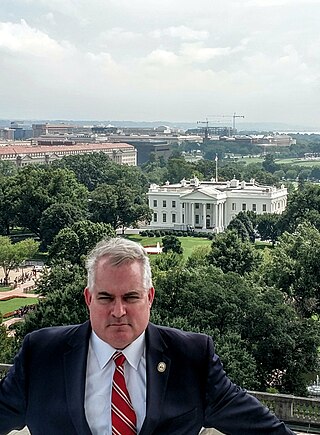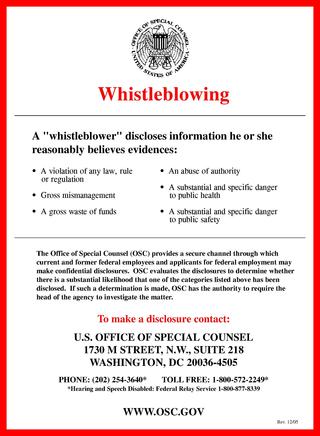Related Research Articles
A whistleblower is a person, often an employee, who reveals information about activity within a private or public organization that is deemed illegal, immoral, illicit, unsafe or fraudulent. Whistleblowers can use an variety of internal or external channels to communicate information or allegations. Over 83% of whistleblowers report internally to a supervisor, human resources, compliance, or a neutral third party within the company, hoping that the company will address and correct the issues. A whistleblower can also bring allegations to light by communicating with external entities, such as the media, government, or law enforcement. Whistleblowing can occur in either the private sector or the public sector.
In the United States, Office of Inspector General (OIG) is a generic term for the oversight division of a federal or state agency aimed at preventing inefficient or unlawful operations within their parent agency. Such offices are attached to many federal executive departments, independent federal agencies, as well as state and local governments. Each office includes an inspector general and employees charged with identifying, auditing, and investigating fraud, waste, abuse, embezzlement and mismanagement of any kind within the executive department.

The United States Office of Special Counsel (OSC) is a permanent independent federal investigative and prosecutorial agency whose basic legislative authority comes from four federal statutes: the Civil Service Reform Act, the Whistleblower Protection Act, the Hatch Act, and the Uniformed Services Employment and Reemployment Rights Act (USERRA). OSC's primary mission is the safeguarding of the merit system in federal employment by protecting employees and applicants from prohibited personnel practices (PPPs), especially reprisal for "whistleblowing." The agency also operates a secure channel for federal whistleblower disclosures of violations of law, rule, or regulation; gross mismanagement; gross waste of funds; abuse of authority; and substantial and specific danger to public health and safety. In addition, OSC issues advice on the Hatch Act and enforces its restrictions on partisan political activity by government employees. Finally, OSC protects the civilian employment and reemployment rights of military service members under USERRA. OSC has around 140 staff, and the Special Counsel is an ex officio member of Council of Inspectors General on Integrity and Efficiency (CIGIE), an association of inspectors general charged with the regulation of good governance within the federal government.
The National Security Whistleblowers Coalition (NSWBC), founded in 2004 by former FBI translator Sibel Edmonds in league with over 50 former and current United States government officials from more than a dozen agencies, is an independent, nonpartisan alliance of whistleblowers who have come forward to address weaknesses of US security agencies.

The Whistleblower Protection Act of 1989, 5 U.S.C. 2302(b)(8)-(9), Pub.L. 101-12 as amended, is a United States federal law that protects federal whistleblowers who work for the government and report the possible existence of an activity constituting a violation of law, rules, or regulations, or mismanagement, gross waste of funds, abuse of authority or a substantial and specific danger to public health and safety. A federal agency violates the Whistleblower Protection Act if agency authorities take retaliatory personnel action against any employee or applicant because of disclosure of information by that employee or applicant.
The Public Servants Disclosure Protection Act came into force in Canada on April 15, 2007. The Act creates two distinct processes: a disclosure process and a reprisal complaints process. It also creates two new bodies: the Office of the Public Sector Integrity Commissioner (PSIC) and the Public Servants Disclosure Protection Tribunal.

The President's Surveillance Program (PSP) is a collection of secret intelligence activities authorized by the President of the United States George W. Bush after the September 11 attacks in 2001 as part of the War on Terrorism. Information collected under this program was protected within a Sensitive Compartmented Information security compartment codenamed STELLARWIND.

Trailblazer was a United States National Security Agency (NSA) program intended to develop a capability to analyze data carried on communications networks like the Internet. It was intended to track entities using communication methods such as cell phones and e-mail.

Thomas Andrews Drake is a former senior executive of the National Security Agency (NSA), a decorated United States Air Force and United States Navy veteran, and a whistleblower. In 2010, the government alleged that Drake mishandled documents, one of the few such Espionage Act cases in U.S. history. Drake's defenders claim that he was instead being persecuted for challenging the Trailblazer Project. He is the 2011 recipient of the Ridenhour Prize for Truth-Telling and co-recipient of the Sam Adams Associates for Integrity in Intelligence (SAAII) award.

The Department of Defense Inspector General is an independent, objective agency that provides oversight related to the programs and operations of the United States Department of Defense (DoD). DoD IG was created in 1982 as an amendment to the Inspector General Act of 1978.

The Department of Defense Whistleblower Program in the United States is a whistleblower protection program within the U.S. Department of Defense (DoD) whereby DoD personnel are trained on whistleblower rights. The Inspector General's commitment fulfills, in part, the federal mandate to protect whistleblowers. It also administers the Defense Intelligence Community Whistleblower Protection Program (DICWP), as a sub-mission for the intelligence community. The Inspector General's Defense Criminal Investigative Service also conducts criminal investigations which rely, in part, on Qui Tam relators.

Daniel P. Meyer is an attorney admitted in the District of Columbia and is currently the Managing Partner of the Washington D.C. Office of Tully Rinckey, PLLC, an international law firm headquartered at Albany, New York, and co-founded by Mathew Tully and Greg Rinckey.
Military Whistleblower Protection Act of 1988 (MWPA), as amended at title 10, United States Code, Section 1034, and elsewhere, is an American law providing protection of lawful disclosures of illegal activity by members of the United States Armed Forces.
The Defense Intelligence Community Whistleblower Program (DICWP) is a sub-mission of the Department of Defense Whistleblower Program. In administering the DICWP, the Office of the Inspector General, U.S. Department of Defense (DoDIG) balances the competing national security and separation of powers interests raised by whistleblowing within the Defense Intelligence Community.The DoDIG provides a safe, authorized conduit for Defense Department whistleblowers to disclose classified information. The Inspector General also has authority to investigate whistleblowing reprisal allegations filed by civilian and military members of the Defense Intelligence Community. It therefore accepts the disclosures and provides source protection for those providing the information. The Department of Defense funds and supervises much of the Republic's intelligence gathering. DoD IG accordingly provides protection to a large number of civilian and military intelligence personnel.

A whistleblower is a person who exposes any kind of information or activity that is deemed illegal, unethical, or not correct within an organization that is either private or public. The Whistleblower Protection Act was made into federal law in the United States in 1989.
The United States Presidential Policy Directive 19, signed by President Barack Obama, is designed to ensure that employees who serve in the Intelligence Community or have access to classified information can effectively report waste, fraud, and abuse, while protecting classified information. It is the executive order establishing standards for all Federal agencies with employees covered by the Directive, including those under Defense Intelligence Community Whistleblower Protection and the U.S. Department of Defense Whistleblower Program. It also prohibits retaliation against these employees for their reports. PPD-19 accordingly establishes a system of Intelligence community whistleblowing and source protection under the Office, Director of National Intelligence and supervised by the Inspector General of the Intelligence Community.

The Intelligence Authorization Act for Fiscal Year 2014 is a U.S. public law that authorizes appropriations for fiscal year 2014 for intelligence activities of the U.S. government. The law authorizes there to be funding for intelligence agencies such as the Central Intelligence Agency or the National Security Agency, but a separate appropriations bill would also have to pass in order for those agencies to receive any money.
John Crane is a former Assistant Inspector General of the U.S. Department of Defense known for his advocacy on behalf of government whistleblowers. He was fired in 2013 and now works for the Government Accountability Project, a non-governmental whistleblower support organization.

Michael Kevin Atkinson is an American attorney. He worked for the United States Department of Justice for approximately 15 years, before becoming the second Inspector General of the Intelligence Community. He assumed office on May 17, 2018.

Andrew P. Bakaj is a Washington, D.C. attorney and former intelligence officer with the Central Intelligence Agency. He was the principal attorney representing the whistleblower who filed the initial complaint that led to the launch of multiple investigations by the United States Congress into the Trump–Ukraine scandal, the impeachment inquiry into President Donald Trump, and, ultimately, the first impeachment of Donald Trump.
References
- ↑ Title VII of Public Law No: 105-272
- ↑ Goss, Porter J. (1998-10-20). "Text - H.R.3694 - 105th Congress (1997-1998): Intelligence Authorization Act for Fiscal Year 1999". www.congress.gov. Retrieved 2019-09-20.
 This article incorporates text from this source, which is in the public domain .
This article incorporates text from this source, which is in the public domain . - 1 2 3 4 "Secret Sources: Whistleblowers, National Security and Free Expression" (PDF). PEN America. November 10, 2015. p. 13. Archived from the original (PDF) on November 14, 2015. Retrieved November 25, 2015.
- ↑ "Statement on National Security Whistleblower Protection" (PDF). Federation of American Scientists . Retrieved December 21, 2010.
- ↑ "Letter from the Office of the Director of National Intelligence" (PDF). Federation of American Scientists. March 8, 2014. Retrieved November 25, 2015.